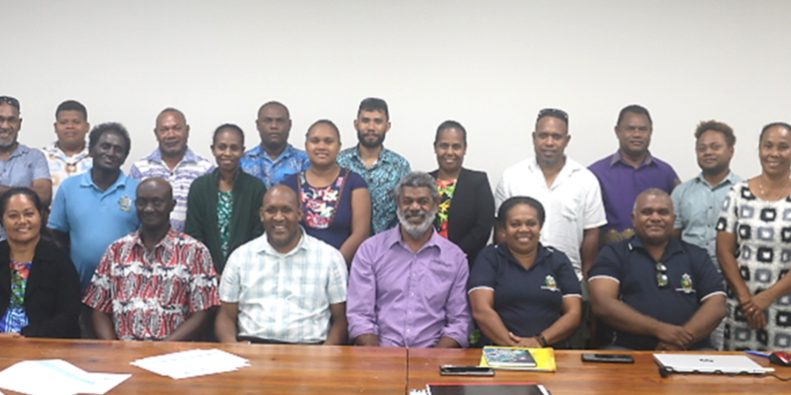STAFF of the Ministry of the Provincial Government and Institutional Strengthening (MPGIS) attended an awareness on the Solomon Islands National Disability Inclusive Development Policy (SINDIDP) 2022-2031 and expressed their appreciation for attending the important familiarisation session.
The awareness session was conducted by Officers of the National Physiotherapy Rehabilitation Division (NPRD) in the Ministry of Health and Medical Services (MHMS) at the MPGIS Conference Room on Monday 7 October.
The new Permanent Secretary for the MPGIS, Dr Derek Futaiasi welcomed the NPRD officers and praised the MHMS for the timeliness of the policy, which he said is set to address disability inclusion.
The MPGIS Deputy Secretary of Governance, Robert Kaua who chaired the meeting, reinforced PS Futaiasi’s sentiments, saying that the MPGIS as the ministry responsible for the nine provinces in the country, stands ready to assist in any way it can to address disability and rehabilitation, which is a huge challenge for public health.
Chief Technical Advisor (CTA) of the Provincial Governance Strengthening Programme (PGSP) and Programme Manager of the Integrated Economic Development and Community Resilience Project (IEDCR), Momodou Lamin Sawaneh notified the NPRD officials that the MPGIS and the nine provinces have already started implementing disability-sensitive infrastructure projects through the PGSP and its performance-based grant.
Mr Momodou explained, much to the appreciation of the MHMS officers, that through the PGSP’s Provincial Capacity Development Fund (PCDF) funded projects in the social sector, projects in education and health (classrooms and clinics) implemented by the nine provinces comply with the Ministry of Education and Human Resource Development and MHMS building design standards.
He provided instances of PCDF-funded clinics that were built utilising the MHMS design, including Kusumba and Tsitsinge in Guadalcanal, during the talks.
Mr Momodou said in response to community demands, 22 percent of the PCDF funds have already been allocated to the infrastructure of the health sector and confirmed that the nine provinces have invested a total of about SBD37 million in 133 worthwhile health-related projects to date.
He further assured the team that the MPGIS would continue to support the sector and incorporate more inclusion for marginalised and disabled people.
During his intervention, Mr Momodou touched on the question of how the regulations will impact the buildings that do not currently comply with the upcoming laws and referred to the Anthony Saru Building and the MHMS headquarters as examples of places where a disabled person might not be able to work if there is no working lift.
The NPRD officials recognised and cited the creation of Ward Development Committees (WDCs) and the appointment of Ward Support Officers (WSOs) through the PGSP’s IEDCR as a more effective structure and a prearranged channel for the MHMS, acting through their Provincial Health Directors, to work together on data collection and furthering the SINDIDP’s noble objectives.
While congratulating the NRDP/MHMS on the successful ratification of the United Nations Convention on the Rights of Persons with Disabilities (UNCRPD), Chief Legal Officer in the MPGIS, David Hiru raised the question of whether plans are in place to enact national legislations to reinforce and domesticate the UNCRPD’s goal, spirit and provisions.
The MPGIS staff applauded the SINDIDP 2023-2301 and raised the need for more collaboration between the MHMS and MPGIS with the nine provinces on investment and delivery of quality health services, especially when it comes to addressing issues and dealing with people with disabilities.
Disability and Program Coordinator Elwin Taloimatakwa and NRDP Director Elsie Taloafiri presented the vision and objectives of the SINDIDP, the disability paradigm shifts, the SINDIDP 2023-2031, the United Nations Convention on the Rights of Persons with Disabilities (UNCRPD), equity and rights in systems and services and discussions, identification and mapping of institutional document frameworks and stakeholders.
In a nutshell, the NRDP pair emphasised the significance of the SINDIDP 2023–2031, referencing the idea of a Solomon Islands society that supports individuals with disabilities as equal members with rights in the nation’s development. The policy adopts the principles of the UNCRDP and the twin-track approach of disability mainstreaming and disability-specific in its implementation. The SINDIDP 10-year policy aligns with the MHMS National Health Strategic Plan 2022-2031.
Actual groundwork on the SINDIDP started in 2013 with consultations with non-government organisations (NGOs), faith-based organisations (FBOs), private sectors, State-Owned Enterprises (SOEs), provincial administrations and government ministries.
Deputy Secretary Health Improvement, Dr Nemia Bainivalu chaired the Disability Policy Development Working Group (DPDWG). The working group comprises MHMS, the Ministry of Foreign Affairs and Trade (MFAT), the Ministry of Women, Youth, Family, and Children Affairs (MWYFCA) and the Disability People’s Association of Solomon Islands.
- MPGIS









